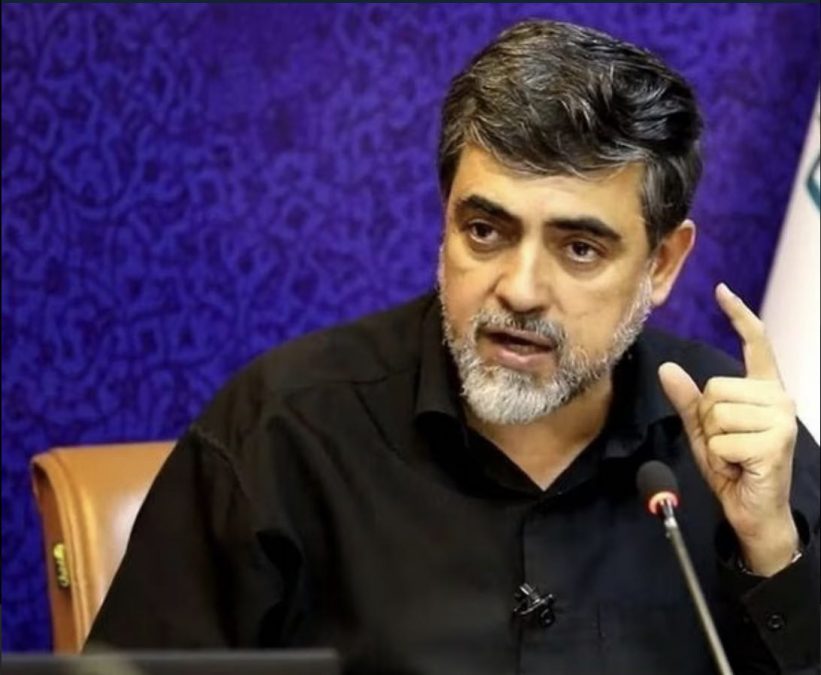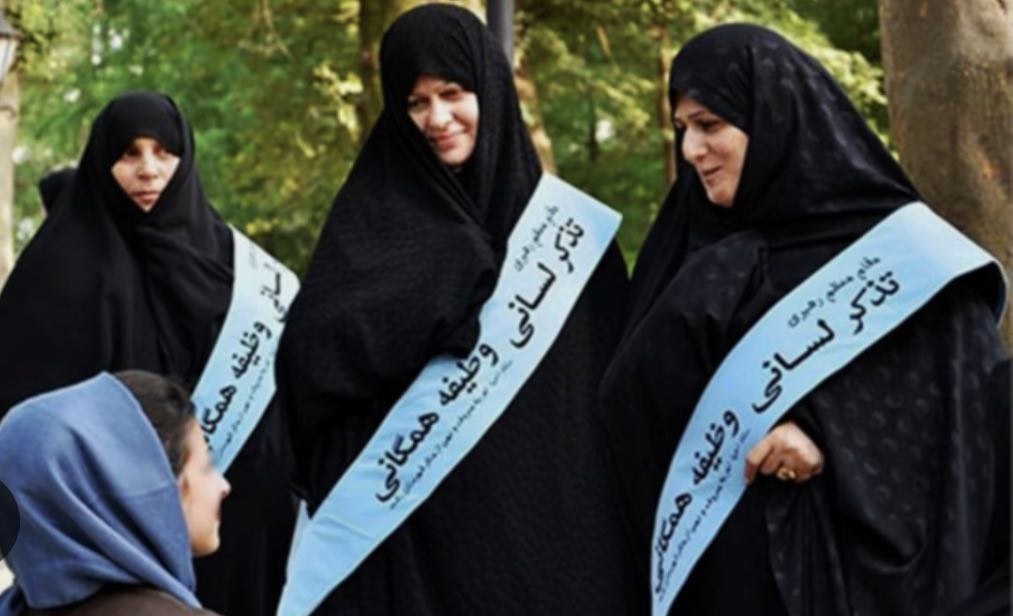The Tall Defensive Wall of the Islamic Republic Against Hijab
The Tall Defensive Wall of the Islamic Republic Against Hijab: According to Iran Gate, the head of Iran’s judiciary recently stated at a conference in Isfahan that unveiling is akin to hostility against the regime and its values, and those who engage in this misconduct will be punished. Unveiling is considered a violation of public modesty and the principles of Sharia and law, and is supported by the enemy.
This is the latest statement by a senior official of the Islamic Republic regarding hijab, a topic that became tense again in Iran not on September 16, 2022, the day it was announced that Mahsa Amini had died in Kasra Hospital after events in the guidance patrol detention center, but two months earlier on July 16, when a video of Sepideh Rashno’s altercation with a veiled woman on a public bus was released.
Hashemi Golpayegani at the Forefront of Defending Mandatory Hijab

The provocative and reckless remarks by the secretary of the Headquarters for Promoting Virtue and Preventing Vice were such that even if the tragic incident of Mahsa Amini in the guidance patrol’s detention, the arrest of Sepideh Rashno, or the video of a mother pleading with a guidance patrol van, or the confrontation of a mountain patrol with unveiled girls, or the revelation of a shooting incident involving guidance patrol officers and a former national boxing team member had not occurred, the statements by Mohammad Saleh Hashemi Golpayegani, the secretary of the Headquarters for Promoting Virtue and Preventing Vice, could have ignited unrest in Iran.
On September 29, three weeks before Mahsa Amini’s death, Iranian media quoted Hashemi Golpayegani, who had repeatedly spoken about the 11-point plan on chastity and hijab, as saying that if a person does not observe hijab in public places like the metro, the metro’s cameras will take a photo of them, and they will be fined a significant amount, which will be mailed to them. Current technology allows images to be matched with national ID photos, enabling the identification of unveiled individuals.
Long before the protests over Mahsa Amini’s death began, calls for stricter enforcement of women’s dress codes were being made by various elements of the regime. The closure of cafes and teahouses, the denial of banking and government services to those improperly dressed or unveiled in cities like Mashhad, even bans on metro entry in Mashhad by the prosecutor’s order, and investigations into government employees whose social media account photos showed them unveiled or improperly dressed, frequently made headlines.
The Issue: Resolution or Law
Beyond all these issues, Ebrahim Raisi also ordered the full implementation of the 2005 resolution on chastity and hijab by the Supreme Council of the Cultural Revolution in mid-July 2022, a resolution many legal experts deemed illegal. The spring and summer of 2022 passed with various decisions and news about stricter enforcement of hijab. Even several weeks after the protests began, the secretary of the Headquarters for Promoting Virtue and Preventing Vice continued to propose ideas that drew criticism from political groups within the government.
Hashemi Golpayegani, in news reported by domestic media including Fars on October 9, stated that if several million internet taxi drivers knew they would be fined for picking up unveiled passengers, over 50% of the hijab violations in vehicles would be resolved. In this case, we would have 4 million promoters of virtue and preventers of vice without any tension, a comment that led some conservative media to call for either Hashemi Golpayegani’s dismissal or for him to remain silent.
Hashemi Golpayegani had publicly declared his manifesto of ideas on July 16, 2022. Some say, why are you so fixated on a strand of hair? In response, it must be said, if this issue is simple, why has the enemy taken it so seriously and says, if we bring down this wall, the rest of the regime’s walls will also collapse.
Following extensive efforts and propaganda to confront anti-mandatory hijab campaigns, the Young Journalists Club wrote on August 21, 2022, that recently, the confrontation with what is called improper hijab has entered a new phase. News about the extent of these fines has been published in virtual space, which has not yet been confirmed or denied. It is said that the fine for a scarf or headscarf falling is 300,000 tomans, a short coat is 150,000 tomans, an open-front coat is 100,000 tomans, not wearing a coat is 500,000 tomans, and heavy makeup is 85,000 tomans.
The Dichotomy of Chaste Living and Woman, Life, Freedom
Eventually, Hashemi Golpayegani consented to remain silent, but 2022 was generally a tumultuous year for the only remaining symbol of the Islamic Republic’s Islamism, the hijab. However, it seems that nearly six months of nationwide and widespread protests by the Iranian people against hijab, with the slogan ‘Woman, Life, Freedom,’ have not caused the Islamic Republic to retreat from hijab. The multitude of plans related to promoting hijab and efforts to draft a law to deal with unveiling indicate that fundamental disagreements between the Iranian people and the established government still persist.
Perhaps one of the most important government plans for hijab is the ‘Chaste Living Plan’ in the Headquarters for Chastity and Hijab, which Mohammad Mehdi Esmaeili, the Minister of Culture, has mentioned. Another is the parliament’s plan. The Minister of Culture, on February 15, 2023, spoke to ILNA news agency about the Headquarters for Chastity and Hijab, saying, ‘One of our inherent duties in the Public Culture Council is related to issues concerning dress and hijab. There, we have sections and desks, for example, the fashion and clothing desk, the social industries desk, and we also have the chaste living desk. Now, you can call it whatever you want; it’s nothing new. Of course, the government’s view is that in this area, the cultural-social approach should prevail.’
Before this, the apparently milder and more ambiguous government plan for hijab on December 6, 2022, was mentioned by Hossein Jalali, representative of Rafsanjan in the Islamic Consultative Assembly, in an interview with the Maniban news site. He spoke about the blocking of bank accounts for unveiled women. The change in method means that it might be announced via SMS to unveiled individuals that they did not observe hijab and should try to respect the law. After the warning, we move to the warning stage, and in the third stage, the bank account of the unveiled individual might be blocked.
This controversy, although accompanied by the denial of the Central Bank’s governor, still had manifestations at that time, including the dismissal of a bank branch manager in Qom who had provided banking services to an unveiled woman.
After a multitude of punitive plans for improper or unveiling, Ayatollah Ali Khamenei, the leader of the Islamic Republic, in a meeting with women on January 4, 2023, said that hijab is undoubtedly a religious and inviolable necessity, but this inviolable necessity should not lead to those who do not fully observe hijab being accused of irreligion or anti-revolutionary behavior. Weakness in hijab is not correct, but it does not mean that the person should be considered outside the circle of religion and the revolution. We all have shortcomings that we should try to correct as much as possible.
It is evident that following these remarks, government plans to deal with unveiled individuals were formulated. In the nationwide resolution of the February 11, 2023, ceremony, prepared by the Islamic Propaganda Coordination Council, it was stated that respect for the hijab law ensures the psychological-social security of society. Officials should, with appropriate measures, prevent the execution of the enemy’s sinister plans and the tarnishing of the dignity and lofty values of Iranian women.
Banking Services to be Prohibited
Less than two days after the February 11 government rally, where Iranian media published images of unveiled and improperly dressed women alongside others, the spokesperson of the Headquarters for Promoting Virtue announced the freezing of the national ID cards of improperly dressed women. According to Ali Khanmohammadi, based on a plan in parliament that is being worked on, the national ID card will be frozen in the system, and services will not be provided to the individual for a month.
Entekhab quoted him as saying, ‘Today, in airports, we see that when a woman passes through the gate without hijab, she is warned. This plan is similar to that. The national ID card is seized after three warnings. This is the parliament’s plan, and today it is being worked on in specialized workgroups. Previously, in the ‘Observer One’ plan in vehicles, the then-police commander announced that 81% of hijab violations in vehicles decreased with SMS notifications. At that time, after the third SMS, the vehicle was impounded.
Furthermore, Abdolsamad Khorramabadi, the Deputy Attorney General in charge of supervising prosecutors’ offices and law enforcement nationwide, wrote in a note published by Iranian media on January 10, 2023, that a directive had been issued by the Attorney General’s Office to the police to decisively deal with unveiling across the country. The main punishment for the crime of unveiling, according to the note to Article 638 of the Islamic Penal Code passed in 1996, is ten days to two months of imprisonment. This was while the sending of unveiling SMS notifications to vehicle owners resumed on January 1, 2023.
On the other hand, representatives of Iran’s leader in various cities made sharp demands to deal with unveiling and, in some cases, privileges for those who observe hijab. Ahmad Alamolhoda, the Friday prayer leader of Mashhad, encouraged men and women to confront unveiling themselves in his Friday sermon on March 3, 2023, saying, ‘The second sedition is in the hijab domain. They have brought the atmosphere to a point where any governmental action in this domain is perceived as governmental hijab, and thus the regime’s security authority cannot take the lead in this area.’
In the matter of hijab, all of you brothers and sisters must stand and confront the unveiling movement. These remarks have been interpreted as a call for self-initiated action to deal with women who do not believe in mandatory hijab. The Friday prayer leader of Ahvaz on February 10, 2023, said, ‘People might temporarily give in to unveiling, but we have neither given in nor will we, and no honorable Iranian Muslim man will allow a woman without a covering to roam the streets. People should give verbal warnings and not remain indifferent.’
On the other hand, Hossein Ali Haji Deligani, a member of parliament, said that the Ministry of Promoting Virtue should be established. In one of the latest statements, Mehdi Bayati, the secretary of the Chaste Living Workgroup, said on March 5, 2023, in Zanjan, ‘The issue of public chastity is one we cannot compromise on because our reasoning is based on civilizational aspects and the cultural origins of Iran. Islam is our second aspect, and in the Surahs of Nur and Ahzab, God has made hijab obligatory, and the third reasoning is political and social, emphasizing the observance of mahram and non-mahram.’
These are aside from the numerous closures of shopping centers, large and small stores, even dental clinics and pharmacies in various cities, and even the suspension of several women from the National Library due to unveiling.

